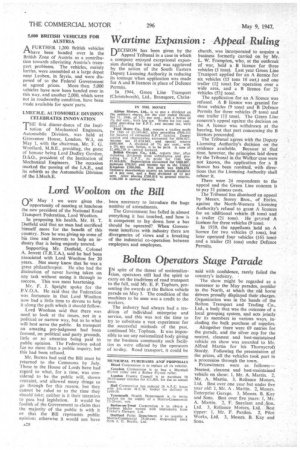Lord Wootton on the Bill
Page 30

If you've noticed an error in this article please click here to report it so we can fix it.
(IN May 1 we were given the
opportunity of meeting at luncheon the new president of the National Road Transport Federation, Lord Wootton.
In proposing his health, Mr. H. T. Outfield said that no man had sacrificed himself more for the benefit of this country. Now he was giving up some of his time and interests to help an industry that is being unjustly treated.
Supporting Mr. DutfreltL Colonel A. Jerrett (T.R.TA.), said he had been associated with Lord Wootton for 20 years. Not many knew that he was a great philanthropist. He also had the distinction of never having taken on any task without seeing it through to success, This was most heartening.
Mr. F. J. Speight spoke for the P.V.O.A. He said that the Federation was fortunate in that Lord Woolton now had a little time to devote to help it along the path which it should follow.
Lord Woolton said that there was need to look at the issues, not in a political or narrow way, but as to what will best serve the public. In transport an amazing pre-judgment had been formed, on political and party grounds, little or no attention being paid to public opinion. The Federation asked for no more than a public inquiry, but this had been refused.
Mr. Barnes had said the Bill must be returned to the Commons by July. Those in the House of Lords have had regard to what, for a time was considered to be the public will, shown restraint, and allowed many things to go through for this reason, but they cannot be ruled as to the time they should take; neither is it their intention to pass bad legislation. It would be foolish of the Government to claim that the majority of the public is with it or that the Bill represents public opinion; otherwise it would not have been necessary to introduce the huge number of amendments.
The Government has failed in almost everything it has touched, and how is it competent to lay down how a bus should be operated? When Government interferes with industry there are divergencies of views and a breaking of the industrial co-operation between employers and employees.












































































